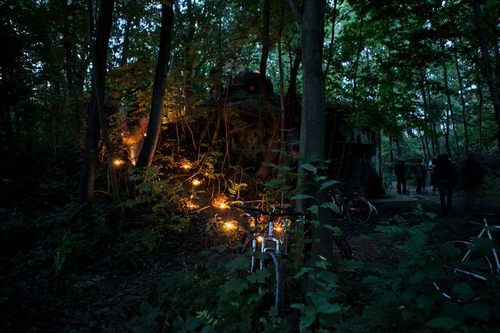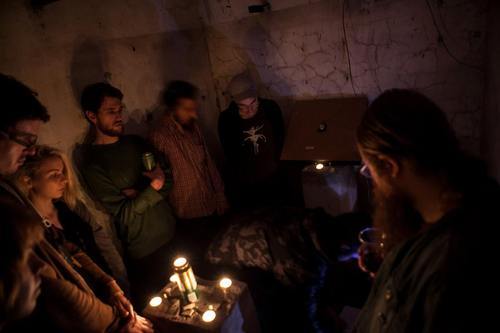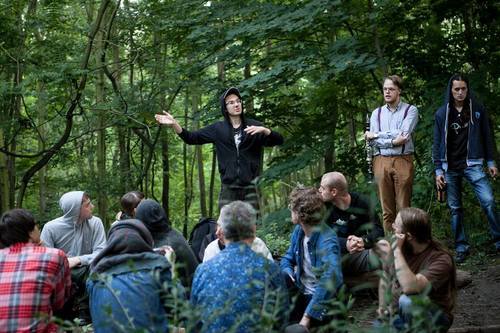The rituals of the ZVŮK festival
Published September, 2014
by Jakub Juhás

ZVŮK has launched its journey across Bratislava urbanism in September 2013. It was then that Jonáš Gruska, the head of the Slovak label LOM which gathers artists from various corners of experimental music, chose the spot under the bridge Apollo in the capital for his event. This year, it moved several kilometres against the stream of the Danube, into the precious biotope of the Pečniansky wood. The sonic intervention into the space of the abandoned army bunker Šterkovšitě, forested with wildwood type of nature, apart from acoustic and aesthetic qualities, also created an unforgettable atmosphere.
Each such abandonment of closed club spaces and venues, eschewing the familiarity of the known centre of the cities gives the sound the possibility to spread in an environment, to communicate with it, in this case decompose amid the indented walls of the bunker, fall into the open holes and escape through the shooting range into the wet forest. The club space gives way to the genius loci, accentuated by the dim light of the candles, omnipresent mosquitoes, 100 percent humidity and solar electric energy – the festival keywords were: outdoor, DIY, drone, sound art, solar-power, in the end.
Music thus becomes part of the biotope, frees itself, this has been its historical wish – to become a part of a bigger whole. Everyone who wants to listen to it, has to make this short trip from the centre to the periphery – to reside in this biotope for a little while, to the border (both figuratively and literally, since the aforementioned bunker is situated on the Slovak-Austrian border). The subtitle sonic blessing festival perfectly embodies the need for this kind of nomadism, the purification from holiday tourism of Bratislava streets. To find music in remote areas, through which it is possible to reflect upon the state of the experimental scene of the centre of the capital. The LOM festival enables this alternative, and the people around Gruska are able to actualize this idea to great results.

The festival programme was inaugurated by the Bratislava-based Matumaru with his vision of rhythmic noise drawing on the ruins of his techno-oriented alter ego Makkatu. Deconstructed rhythms placed in a claustrophobic space, flowing through a mass of bodies, the only thing that is missing to ritual exaltation, is higher volume. Under the expressive name, Smrt (Death), one of the members of the local label Nomad Sky Diaries (moniker 900piesek, 900piesek.blogspot.com), oriented on various extreme noise expressions, also took to the stage.
Shorter acoustic industrial performances on steel, wooden sticks and metal instruments conjured the image of a passenger, who carries a plate of metal through the city and later, a dark forest.
The Viennese duo Burlin Bird, composed of members of Bird People and Burlin’ Mad unleashed their repetitive, tribal drone folk mixing electronics with acoustic instruments (a whistle made out of funnel, primitive string instrument and a dunkar – a ritualistic shell-like trumpet) mostly expressed the poetics of the place. Long tones of the dunkar spread across the surrounding forest. The improvisations of the trio, based in Vienna also under the name Arn-Rehformen-Weikinger, armed with a cello, acoustic and electric guitars, alternated quiet passages with noise orgies. Culminating drone sections were coupled with Rosi Rehformen’s almost inaudible squeaky voice.

The apex the bunker had been dreaming about. The evening was brought to an end by 21st century troubadour András Cséfalvay, amid candlelight and poetry. The LOM label ambassador, Slovak visual artist, fiend of eclecticism, who surprised everyone with his album Funeral the Musical and another tabletop opera last year based on Margaret Thatcher’s funeral, continues with his intimate miniatures, replacing piano for acoustic guitar and clarinet this time, resulting in introverted freak folk, unheard of in Slovakia.
PS: In the past, there were ownership legal disputes around the area of the forest. The ZVŮK festival thus acts as an example of a creative reclaiming and reviving of peripheral parts of a city, which are not frequented by local residents.
This article was supported by the Intenda Foundation.